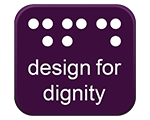Design For Dignity
Retail Guidelines




In a 2013 AND survey of telecommunications customers with disability it was found that communication is a key issue. Frustration occurs when a person with disability struggles to understand the operator or cannot get their message across. This is compounded if there are operational issues encountered such as long automated voice options or the caller is using the National Relay Service and the operator does not understand how to work with this.
“Entering long account codes — with limited vision and one working arm it is impossible for me to do this so I require assistance to call.”
Where someone depends on a partner or carer to make contact, this is also difficult due to identification processes. When the process works well, the business benefits:
“The company I am with do have excellent and respectful representatives and do their best to assist me so I can understand and do not make me feel silly. Consequently, we have our two mobile (partner's and mine) phones, landline and broadband packaged together and my partner can talk on my behalf if I am unable to do so.”
In the survey, AND asked participants to detail any specific barriers or obstacles they faced when using a contact centre/call centre and describe how the experience made them feel. Some comments that didn't relate to accessibility have been left out, but the feedback supports the sorts of issues and experiences you might expect. Difficulty hearing strong accents or against background noise and difficulty getting people to understand their particular needs and to assist, were common issues.
“A big problem is the lack of clear spoken English on the part of many customer service people. Staff with accents speak far too quickly and do not slow down sufficiently even when asked to do so repeatedly.”
“Ringing back until you get experienced, well trained staff with no strong accent is very time consuming [when I] register new SIM cards.”
“I have to get my partner to ring back as I can't hear what the representative is saying. This makes me feel frustrated. I particularly have problems understanding certain accents.”
“Difficult to hear conversation due to background noises from my end and other end.”
“Hearing the information is very difficult over the phone.”
“Only difficult to hear the conversations due to background noises from my end and the other end.”
“Staff did not understand my disability related needs. Eventually left service provider.”
“The call centre staff don't usually understand what it means to have a disability. So when you explain to them you can't read something they just keep asking for that information. Sometimes you give them personal information to look up your details and they say they can't find you or that their department doesn't have access to that information.”
“Call Centre staff did not understand what a disability was. Also how important it is that I had continued service on my phone.”
“I feel quite stupid when trying to work with phone company staff who can't find a way to cope with alternatives in being unable to access another phone or messages while talking to them — really frustrating.”
“It appears that organisations expect customers to use the internet to address needs.”
“The phone call can require you to say something and the automated computer thingy does not understand you and you say it again, and again, and again. It just does not work well. I hate being on hold and not knowing how long I am needing to be on hold.”
Often retailers have a call centre or contact centre to assist with product or service enquiries or to make ‘out-bound’ sales calls. Research commissioned by the independent regulator and competition authority for the UK communications industries, Ofcom, conducted research into the needs of customers with disability, “Things disabled people tell us”*“Disabled people” is acceptable terminology in the UK and New Zealand, but Australia and the US use the terminology “People with a disability”. include the following: